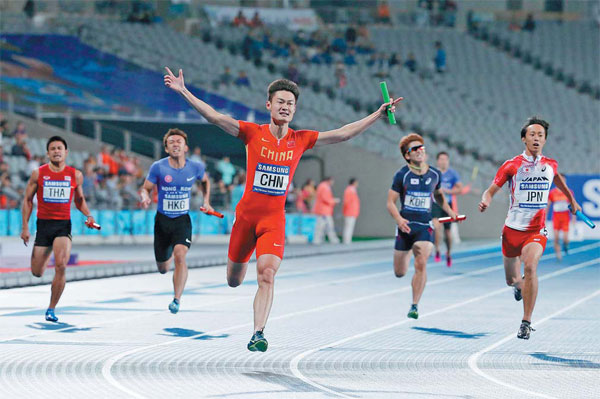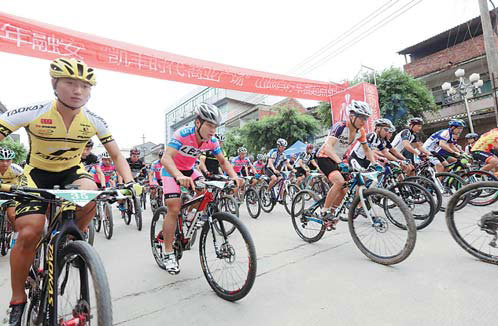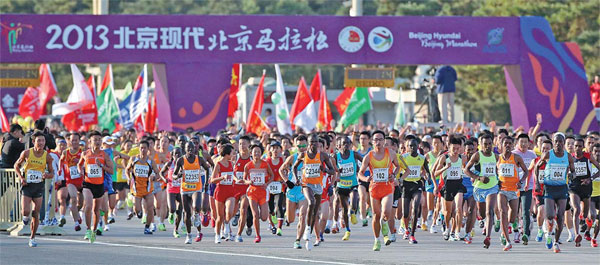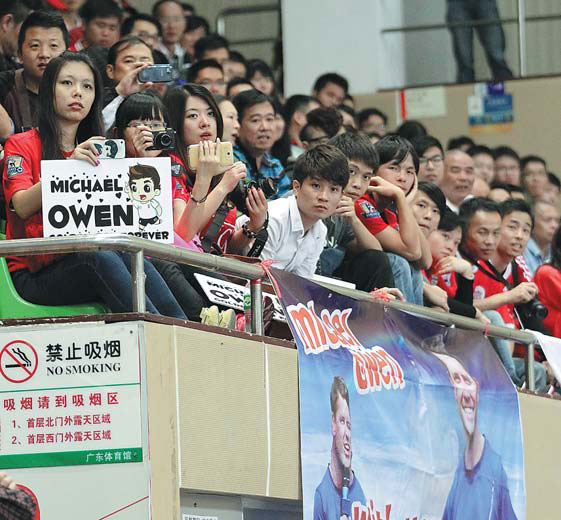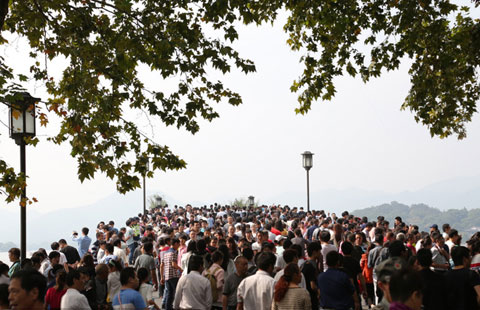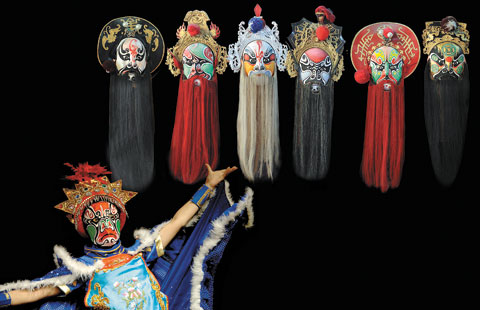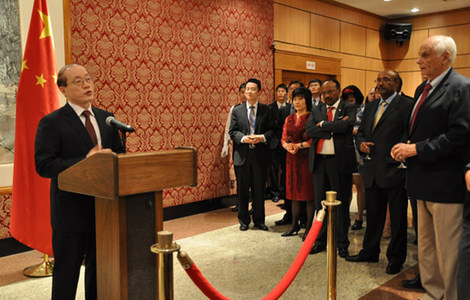Sowing sporting seeds of growth
Updated: 2014-10-03 08:01
By Sun Xiaochen(China Daily USA)
|
||||||||
Latest govt move to relax administrative procedures for sports events bodes well
It started out as a simple tournament for amateurs, but grew to a two-division system boasting more than 30 squads.
The establishment of the GDF Guangdong Professional Five-a-side Super League could have taken decades by other soccer groups, but its founder, Liu Xiaowu, took only three years to achieve it.
The growth of the league was a beneficiary of a pilot policy by Guangdong province in 2012. The move relaxed regulations for private organizations to run mass sporting events independently.
Under the policy, Liu could set up the league without getting approval from the government through complicated document checks and paying administration fees.
The GDF league is the first of its kind being operated by a non-governmental association outside China's State-run sports governing system, unlike its elite counterpart, the Chinese Super League, which is run by the CSL Company, in which the State soccer governing body has a majority stake.
"In China, you used to be allowed to organize a sporting event only after getting the 'green light' from sports administrative bodies and that took lengthy document processing and cost money," said Liu, a former executive of a local club in the country's top-division 11-a-side league.
"(After establishing our own association), we could run the league with decisions made by shareholders based on our own needs. That's why we expanded so quickly," he said.
With the central government's decision to relinquish approval and overseeing rights for commercial and mass sporting events, more private investors and NGOs like Liu and his league will be expected to dream big in the current State-dominated sports industry.
The decision, made at a State Council executive meeting last month, is expected to "unburden enterprises to the utmost and give vitality to all kinds of sporting resources", according to a statement released after the meeting.
Currently, all sporting events are subject to approval by the General Administration of Sport in China and its branch event administrative centers as well as local sports bureaus.
These groups also charge fees based on the importance of the event and its ability to attract advertisers.
The State Council meeting called for the scrapping of the two-decades-old rule and urged relevant government departments to give the green light to commercial and mass events organized by NGOs and private funders.
The meeting also called for the broadcasting of sporting events to be opened to more media companies. China Central Television now dominates such broadcasts.
Bao Mingxiao, a sport sociologist at the China Institute of Sport Science, envisions a significant reform of the country's sports landscape by the top authority.
"It shows that the central government will value the sports industry more in the country's economic growth and shift its sporting focus from winning medals at major events to boosting the sports market and the public's sports participation," said Bao, who is a panelist of the State Council's sports policy discussion.
The decision was welcomed by luminaries in China's sports circle, including former NBA star Yao Ming, who submitted a proposal at the Chinese People's Political Consultative Conference regarding the same issue in March as a political advisor.
"I am really glad that the State Council made such a big change to cancel the event-approval system," said Yao, who has been active in organizing and participating in grassroots sports and education events with his Yao Foundation since retiring in 2011.
"Due to the approval procedure, we used to organize events that entailed high costs including administrative fees, which would be passed on to consumers or participants. Our government should relinquish more rights to the market," Yao said.
Event organizers echoed Yao and expected the new rules to improve their business prospects with smaller budgets and time and manpower costs.
Beijing Bolide Sports & Entertainment, which brought the Italian Super Cup, an exhibition game between the Serie A champion and Italian Cup winner, to Beijing as a co-organizer in 2009, had to pay about 3 million yuan ($486,000) for government permits and to meet regulations for security and fire control.
The whole processing period took at least 30 days with every procedure going smoothly before the company was given the green light, Bolide executive Qin Zheng said.
"Hopefully, we don't need to go through each of the checking and approving procedures any more with the new policy," Qin said.
Some foreign organizers also applauded the policy, which they believed would loosen up the tight bureaucracy in sports administration in China.
EN Garde Marketing GmbH, a German-based sports event company, has jointly organized the FEI (Federation Equestre Internationale) World Cup Jumping China League in Beijing together with the State-owned Chinese Equestrian Association for four consecutive years, and knows how complicated it can be to run an international event in China.
"All kinds of bureaucracy (here) make it more complicated, which normally doesn't have to be that way. That makes it much tougher not only from the sporting perspective but also for the sponsor acquisition. If (the new policy) happens, it's definitely good news (for foreign companies and investors)," said Christoph Johanning-Moellerhaus, representative of EN Garde.
Implementation issues
Despite the warm welcome for the central government's move, some say there are still policy-implementing issues which need to be resolved through further supporting measures and detailed rules.
Categorizing commercial and mass events open to NGO and private investors on the country's packed sporting agenda has emerged as the first issue.
Prior to the State Council's meeting, the General Administration of Sport in China classified all the sporting events registered under its umbrella into three categories - A, B and C - and decided to only relinquish organizing rights of the small-scale domestic events in the C group.
With the new policy urging all commercial and mass events to be released, the public expects more events to be included in category C.
However, GASC has not officially responded to the central government's new policy with detailed measures nor explained the classification standard.
Some sports administrators said the amount of power to delegate remains debatable.
"Canceling administrative approvals or reducing fees doesn't mean that sports governing bodies should be hands-off," said Li Nianxi, director of the bicycle and fencing sports administrative center's equestrian department and secretary-general of the Chinese Equestrian Association.
"Even for events run by NGOs or private-investors, we still have to examine if they are operated in line with international standards and provide logistics support by overseeing the operation," Li said.
Lu Yuanzhen, a renowned sports sociologist at South China Normal University, raised another issue - without government approval documents, social and private organizers would hardly be able to gain support from other relevant government agencies like the public security, fire control and commerce departments.
"We still need more detailed measures to collaborate with other departments on a bigger picture. Otherwise, organizers have to apply for approvals or cooperation with other governmental departments one by one, even though they are approved in the sports circle," Li said.
"That will be going against the original intention of the policy."
sunxiaochen@chinadaily.com.cn
|
China's Zhang Peimeng celebrates victory in the men's 4x100m relay final at the Asian Games in Incheon, South Korea, on Thursday. The Chinese team set an Asian record of 37.99 seconds. The record was previously held by the Japanese. Jason Reed / Reuters |
|
A new policy to relax administrative procedures for popular sports events is expected to boost the development of different sports among the public. Provided to China Daily |
|
The annual Beijing International Marathon has become one of the most popular events in the capital. Cao Can / Xinhua |
|
Spectators watch a futsal game in Guangzhou, Guangdong province. Provided to China Daily |
(China Daily USA 10/03/2014 page3)
Most Viewed
Editor's Picks

|

|

|

|

|

|
Today's Top News
Xiamen dancers dazzle Ft Meade
'One Country, Two Systems' vital
China, US voice commitment to ties
US visas hinder talent search: expert
IMF calls for more global growth
GM to invest $14bn in China
HK official to meet with Occupy Central students
Evernote announces new products
US Weekly

|

|
